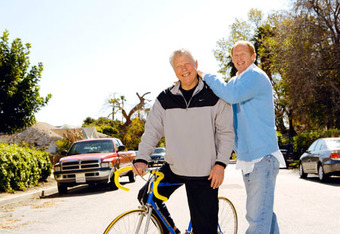

The Marinovich Project accomplishes everything that a great documentary sets out to do. It found a little-known or misunderstood story, examined the facts from first-hand sources and then presented an engrossing narrative that changed the audience’s understanding of the topic. On top of it all, it posed questions that we as a society need to reflect on.
For a quick review: Marv Marinovich, former USC Trojan and Oakland Raider, was the first strength and conditioning coach in NFL history. He was obsessed with training methods and would seek out as much information as possible from other countries in an attempt to become the most knowledgeable on the subject. His practices were revolutionary at the time.
Marv would later test his theories on his son, Todd. Marv wanted to see what would happen to a child if they were bred and raised under ideal conditions. Therefore, he began stretching Todd when he was an infant and fed him only fruits and vegetables.
Todd would go on to be labeled “Robo QB.” His story became national news: a child who had never eaten a Big Mac (which Todd states isn’t true in the documentary) and that has been working out since he was five under the conditions set by Marv. Marv would become the poster-child for the dangers of being an over-bearing parent.
Todd would go on to star at USC, but would battle drug problems throughout. Marinovich would later be drafted by the Raiders and spend two short years with the organization, before being suspended for testing positive for drugs.
His NFL career was over, but his drug usage was not. Marinovich would become addicted to heroin in the mid-90s. He eventually played arena football in the early 21st century while habitually abusing heroin. He states in the documentary that the only reason he returned to the arena league was for a paycheck to feed his addiction.
That’s the common, well-known story. Marv is a crazy parent, Todd does drugs as a result, Todd bottoms out, insert joke about Todd (he would become known as Marijuana-vich).
As The Marinovich Project begins to reveal, maybe it wasn’t that simple.

Todd takes full responsibility for his decline and doesn’t hold any grudges against his father. In fact, the two have a very healthy relationship. They attend USC football games, art galleries and even worked on an art project together.
Was there something missing in the documentary? If it isn’t Marv’s fault that Todd started using drugs, then what was the reason? Todd mentions that he started smoking marijuana in high school as a release. A release from what? From Marv? Just because Todd doesn’t feel Marv is responsible doesn’t exonerate Marv fully from potentially having a hand in developing pressures that would later lead to drug abuse.
It seems as if this unanswered question is one of the shortcomings of the documentary, but in reality it is one of the strengths. The Marinovich Project didn’t seek out to answer the question of why Todd became addicted to drugs or failed, it just presented the unbiased facts. It’s up to the audience to decide if Marv’s over-parenting was a good or bad thing.
One other subject stands out above all else in the film. Todd is quoted as saying: “Just because you’re good at something, does that mean you’re born to do it?” He later adds how oftentimes strangers will come up to him on the street and tell him how he blew his chance to be something big, often times starting with “if I had your talent…”
It’s a reminder of how fascinated as a society we are with athletes’ failure. On one hand we hate to see anyone waste talent. It’s why Disney doesn’t release films where the protagonist fails in the end and why Raging Bull is such a harrowing film. We hate to see talent squandered, when in reality, it shouldn’t really matter to us what Todd Marinovich decides to do with his life.
On the other hand, it’s almost as if our society welcomes failure. We would never admit it, but it is the equivalent of not being able to turn away from the train wreck. Even when the train wreck isn’t there, we attempt to build one.
Take the case of Tim Tebow, a Heisman trophy winner and two time national champion at the University of Florida. The overriding narrative is that he cannot perform well in the NFL. Guess what? A lot of players don’t make it in the NFL…why is there so much backlash against Tebow? He was built up into a mythical force at the University of Florida and is now getting torn down. It’s the media’s way of creating failure when there isn’t any.
That’s what we had with Marinovich. He was built into Robo-QB and was, like so many before and after him, labeled the next quarterback of the future (the documentary even has a sound byte where someone calls Marinovich the best prospect since John Elway…sound familiar?). When he struggled, the media tore him down.
There’s a beautiful irony that sums up the whole story. When Todd was labeled Robo-QB, the public empathized with Todd and simultaneously vilified Marv as someone who didn’t care for his own son’s well-being. When Todd became sick, the public made him into a punch-line, while Marv was the one who helped him through rehab and detox, holding his son as he threw up all over himself.
The Marinovich Project is a success because it changes our way of thinking on multiple levels. On the surface it changes our understanding of the relationship between Todd and Marv. On a deeper level, it challenges us to rethink our expectations from professional athletes. It’s also a reminder that even if someone is branded “robo,” that they are still human.


